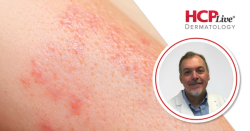
OR WAIT null SECS
Study Highlights Real-World Data on Efficacy, Daily Clinical Use of Tralokinumab for Atopic Dermatitis
The global, real-world TRACE study was designed to improve the understanding of tralokinumab’s safety, efficacy, and clinical utilization in daily practice for eczema.
A recent global, real-world study suggests that tralokinumab is being prescribed for atopic dermatitis (AD) patients as a first-line biologic option for treatment within the US, with a heavy burden of disease among patients and substantial impacts on quality of life being observed.1
This study, titled ‘Tralokinumab real-world use in adults with atopic dermatitis: baseline characteristics of the first 100 patients recruited to the TRACE study in the United States,’ was published in the British Journal of Dermatologists. It was led by investigators such as April W. Armstrong, MD, MPH, professor and chief of dermatology at University of California Los Angeles.
Tralokinumab itself is a fully human monoclonal antibody with high affinity, designed to specifically neutralize interleukin(IL)-13, a crucial element involved in the development of atopic dermatitis. Atopic dermatitis is also referred to as eczema interchangeably in this summary of the interim analysis.
Armstrong and colleagues noted that clinical data from prior studies has suggested that the drug is efficacious for patients facing moderate-to-severe eczema, adding that tralokinumab maintains a favorable safety profile.2 Despite these prior findings, the investigators noted the limited level of evidence available regarding the use of the drug within everyday clinical settings.
It is in these settings, Armstrong et al. noted, where patient management may vary from the established clinical trial protocols. In the TRACE study, designed as a global, observational, real-world trial, the objective was to improve on this lack of prior data by improving the overall understanding of the tralokinumab’s efficacy and safety among those with eczema specifically in daily practice.1
The ways in which tralokinumab impacts the clinical signs and symptoms of eczema were the investigators’ major objective, basing the information on the guidelines which had been approved in each of the study’s included countries. Secondary goals of the team included evaluating patients’ quality of life, safety, patient-reported outcomes (PROs), and their adherence treatment.
Design and Findings
TRACE’s research team focused their attention on a single cohort of adult patients that had moderate-to-severe atopic dermatitis and were being treated with tralokinumab therapy. The team’s work involved subjects found in 11 countries, all of which included North America, Europe, and the Middle East.
The team’s interim analysis was written with the goal of presenting subjects’ baseline characteristics, specifically among the initial 100 participants recruited within the US.
Overall, the investigators found that 55% of the initial 100 subjects found in the US who had begun treatment with tralokinumab in TRACE were reported as female. They also noted that the 54% had been White, 12% Asian, and 18% Black or African American.
The research team also noted that the mean (standard deviation [SD]) age of the participants had been 46.4 years (18.2), adding that the mean body mass index (BMI) had been shown to be 28.6 kg/m2 (7.7). The team found that the mean duration of participants’ disease had been found to be 13.9 years (SD 16.5), also noting that 54% of them had experience with biologic therapies and 46% had been biologic-naïve.
The investigators reported that 88% of the study subjects were shown to have moderate-to-severe disease, adding that there was a mean Eczema Area and Severity Index (EASI) score of 15.4 (SD 7.9) and a mean Investigator’s Global Assessment (IGA) score of 3.2 (SD 0.8). Notably, they found that there had been a heavy symptomatic burden of disease among these participants, expressed through a mean worst daily pruritus numerical rating scale (NRS) score score of 6.1 (SD 2.6) and a mean eczema-related sleep NRS score of 4.2 (SD 3.3).
The research team noted that 24% of those in the initial analysis were found to have ≥1 atopic comorbidity, adding that cardiovascular disease was seen among 8%, asthma among 12%, and autoimmune disease among 6%. They expressed that 3% of subjects reported a psychiatric illness and that there had been substantial impacts of the skin disease on patients’ quality of life, with a mean Dermatology Life Quality Index (DLQI) score of 13.2 (SD 8.5).
Overall, Armstrong and colleagues concluded that those observed in the initial interim TRACE analysis had been shown to have a heavy disease burden with major effects observed on subjects’ life quality.
References
- Armstrong AW, Rubin C, Rodriguez R, et al. 557 - Tralokinumab real-world use in adults with atopic dermatitis: baseline characteristics of the first 100 patients recruited to the TRACE study in the United States, British Journal of Dermatology, Volume 190, Issue Supplement_2, February 2024, Pages ii54–ii55, https://doi.org/10.1093/bjd/ljad498.056.
- Butera A. FDA approves tralokinumab-ldrm for atopic dermatitis in adults. HCP Live. December 28, 2021. Accessed June 8, 2024. https://www.hcplive.com/view/fda-approves-tralokinumab-ldrm-atopic-dermatitis-adults.
Related Content:


